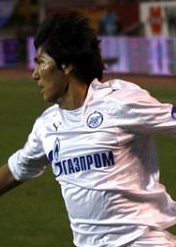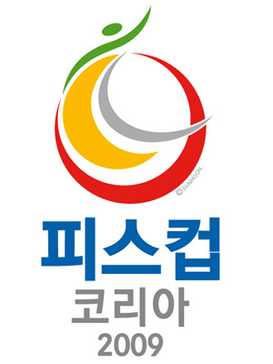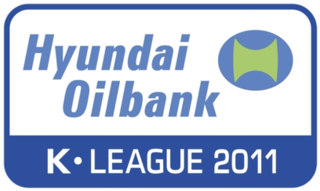
The Pohang Steelers are a South Korean professional football club based in Pohang, North Gyeongsang Province that compete in the K League 1, the top flight of South Korean football. The Steelers were founded on 1 April 1973 and were originally called POSCO FC after the steel-making company POSCO, which still owns the club today. They are one of South Korea's most successful teams, having won the K League five times and the AFC Champions League three times.

Kim Dong-jin is a former South Korean footballer who played as a full-back or a wing-back. He is currently the assistant coach of Hong Kong Premier League club Kitchee.

Choi Tae-uk is a South Korean football coach and former player who is assistant coach of South Korea.
Choi Yong-soo is a South Korean professional football manager and former player.

Seo Jung-won is a South Korean football manager and former player, currently in charge of Chengdu Rongcheng.

Hwang Sun-hong is a South Korean former football player and current head coach of the South Korea national under-23 football team. He was the most notable South Korean striker in the 1990s and early 2000s.
This article shows the 2006 season of South Korean football.

Dejan Damjanović, also known mononymously as Dejan, is a Montenegrin professional footballer who plays as a forward for Hong Kong Premier League club Kitchee. He is regarded as one of the greatest K League players of all time.
The 1996 Korean Professional Football League was the 14th season of K League since its establishment in 1983. South Korean government and the Korean Professional Football Federation introduced a decentralization policy to proliferate the popularity of football nationally in preparation for the 2002 FIFA World Cup, which they wanted to host, so some clubs located in the capital Seoul moved to other cities according to the new policy in this season.

The 2008 K League was the 26th season of the K League. The regular season and playoffs' format was the same as the one used in the 2007 season. It began on March 8, and the final of the playoffs finished on 7 December.

The 2009 Korean League Cup, also known as the Peace Cup Korea 2009, was the 22nd competition of the Korean League Cup. It began on 25 March 2009, and ended on 16 September 2009.
The Daehan Fire Insurance Cup 1999 was the eleventh competition of the Korean League Cup, and one of two Korean League Cups held in 1999.
The 2009 K League Championship was the 13th competition of the K League Championship, and was held to decide the 27th champions of the K League. The top six clubs of the regular season qualified for the championship. The winners of the regular season directly qualified for the final, and second place team qualified for the semi-final. The other four clubs entered the first round, and the winners of the second round advanced to the semi-final. Each match was played as a single match, excluding the final which consisted of two matches. Jeonbuk Hyundai Motors became the champions for the first time by defeating Seongnam Ilhwa Chunma 3–1 on aggregate in the final.

The 2010 K League, officially known as Sonata K-League 2010, was the 28th season of the K League. It was sponsored by Hyundai Motor Company, and was held from 27 February to 5 December 2010.

The 2010 Korean League Cup, also known as the POSCO Cup 2010, was the 23rd competition of the Korean League Cup. It began on 22 May 2010, and ended on 25 August 2010.
The 2010 season is FC Seoul's 28th season in the K League Classic.
The 2010 K League Championship was the 14th competition of the K League Championship, and was held to decide the 28th champions of the K League. The top six clubs of the regular season qualified for the championship. The winners of the regular season directly qualified for the final, and second place team qualified for the semi-final. The other four clubs entered the first round, and the winners of the second round advanced to the semi-final. Each match was played as a single match, excluding the final which consisted of two matches.

The 2011 K League, officially known as Hyundai Oilbank K-League 2011, was the 29th season of the K League. It was sponsored by Hyundai Oilbank.
The 2011 K League Championship was the 15th and the last competition of the K League Championship. It was held to decide the 29th champions of the K League. The top six clubs of the regular season qualified for the championship. The winners of the regular season directly qualified for the final, and second place team qualified for the semi-final. The other four clubs entered the first round, and the winners of the second round advanced to the semi-final. Each match was played as a single match, excluding the final which consisted of two matches.
The 2008 K League Championship was the twelfth competition of the K League Championship, and was held to decide the 26th champions of the K League. The top six clubs of the regular season qualified for the championship. The winners of the regular season directly qualified for the final, and second place team qualified for the semi-final. The other four clubs entered the first round, and the winners of the second round advanced to the semi-final. Each match was played as a single match, excluding the final which consisted of two matches. Suwon Samsung Bluewings became the champions by defeating FC Seoul 3–2 on aggregate in the final.










